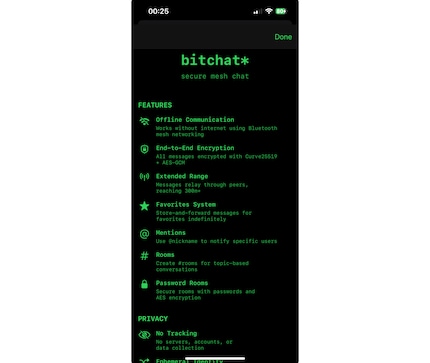
New news service Bitchat works without the Internet

When the power goes out, so does internet communication - even if your smartphone still has power. Twitter founder Jack Dorsey's new messaging service Bitchat uses a Bluetooth network for offline communication.
When the power goes out, so does internet communication - even if your smartphone still has power. Twitter founder Jack Dorsey's new messaging service Bitchat uses a Bluetooth network for offline communication.
Text:
Communicating with others via messenger app - without the internet, radio masts and centralised servers? That was previously unimaginable. But this is exactly the idea that Jack Dorsey, known as the founder of Twitter and co-founder of Bluesky, had. However, Bitchat, Dorsey's experimental, decentralised messaging service, is no competition for WhatsApp & Co. The way the app works limits its use to the offline neighbourhood with many people. The main focus is on security, anonymity and circumventing censorship.
On Github, Dorsey describes how the service works in more detail. Bitchat works like a mesh network and is based on the same Bluetooth principles as Apple's Airtag and Samsung's Smarttag: The more people use Bitchat, the better it works.
Bitchat is currently undergoing a closed beta test. Whether, when and how the project will be opened to the public remains to be seen.
Bitchat utilises the Bluetooth range of other devices
The new messenger uses Bluetooth Low Energy (BLE) to create a mesh network with other devices for a peer-to-peer messaging service. Devices can communicate directly with each other within their Bluetooth range. Each device is given a unique identifier for this purpose.
For longer distances, participants are required whose devices serve as «connection bridges». To prevent messages from circulating endlessly via bridge devices in the network, a range limit is also built into the software: A message may only be forwarded via bridge devices seven times, after which it expires. This results in a total range of around 300 metres.

Source: Jack Dorsey auf Twitter
If the recipient is temporarily unavailable, the message is temporarily stored on other devices. As soon as the recipient logs back into the Bitchat network, the message is delivered.
In future, the messenger could also use internet protocols to a limited extent, «as long as its core principles are not violated», as Dorsey writes on Github. And these include security and anonymity.
Security should come first
Dorsey is an avowed supporter of the idea «Protocols, not Platforms». The idea behind this is that communication should not take place via individual platforms because there is always a risk of censorship and compromise.
Instead, messages should be forwarded in a decentralised manner with the help of smart protocols such as BLE. This removes them from the control of the platform operators. Bitchat could therefore prove its worth where the internet is monitored or access to it is denied.
According to Dorsey, the open source service can also be used anonymously: a telephone number, email address or other identifiers are not required. The messages are also end-to-end encrypted.
However, the app has not yet been tested for security against hacking attacks. The magazine Techcrunch has therefore issued a warning for users in beta testing: The app is not to be trusted so far. Dorsey's promise of security in particular could raise false expectations. It is possible to assume the identity of other people and send and receive messages in their name. In the article, security expert Alex Radocea accuses Dorsey of only using the security promise to generate attention.
Where the app could prove its worth
Bitchat is intended for private communication in physical proximity. You can't use it to exchange messages across the pond, maybe not even with your mate down the road.
Bitchat comes up trumps in places where there is no internet or where it is overloaded or monitored: in disaster areas, at protests and, of course, during urban power cuts. In this way, people can organise themselves as long as their smartphones are charged. The performance of the app adapts to the battery level of the smartphone. If it is lower, the environment is searched less frequently for other participating devices.
The system works best where many people use the service - so it is predestined for use in hotspots.


Feels just as comfortable in front of a gaming PC as she does in a hammock in the garden. Likes the Roman Empire, container ships and science fiction books. Focuses mostly on unearthing news stories about IT and smart products.